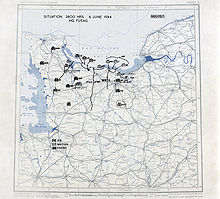- D-Day
-
Der Ausdruck D-Day bezeichnet im Englischen größtenteils den Stichtag militärischer Operationen. Ein vergleichbares deutsches Wort ist Tag X, ein französisches jour J. In vielen Sprachen steht der Ausdruck heute speziell für den 6. Juni 1944 als Beginn der Landung der Alliierten in der Normandie im Zweiten Weltkrieg.
Inhaltsverzeichnis
Wortherkunft
Das Kürzel D-Day (ebenso wie H-Hour oder X-Tag) bezeichnet den Zeitpunkt einer größeren militärischen Operation, ohne etwas über Inhalt, Ort oder Zeitpunkt selbst zu verraten. D-Day wird dabei im Englischen auch als Kürzel für Day Day, Decision Day, Delivery Day, Deliverance Day, Doomsday oder Debarkation Day angesehen, doch ist die Herkunft der Bezeichnung nicht gesichert. Als alternative Erklärung findet man häufig auch, dass D und H einfach Wiederholungen von Day beziehungsweise Hour sind. Dafür spricht, dass die Franzosen „Jour J“ sagen, was dem gleichen Schema folgt. Vermutlich wurde dies zunächst nur als Platzhalter für einen bestimmten Tag und eine bestimmte Uhrzeit verwendet, wobei diese noch nicht feststanden.
Die erste nachweisliche Nutzung der Bezeichnungen war im Ersten Weltkrieg und findet sich in der Field Order Number 9, First Army, American Expeditionary Forces vom 7. September 1918 zur Schlacht von St. Mihiel. Dort heißt es:
- The First Army will attack at H hour on D day with the object of forcing the evacuation of the St. Mihiel Salient. (dt. etwa „Die Erste Armee wird zur Stunde H am Tage D angreifen, mit der Aufgabe die Räumung des St.-Mihiel-Bogens zu erzwingen.“) „Combat Orders“ der „General Service Schools“ in Fort Leavenworth, Kansas, 1922
Dementsprechend wird in der Planung der Operationen unabhängig vom schließlich festgelegten Tag für die Schritte/Aufgaben an den Tagen davor und danach folgendermaßen gezählt: D − 4 steht z. B. für den 4. Tag vor dem Tag X, D + 7 für den 7. Tag nach dem Tag X.
Invasion in der Normandie
Das bekannteste Beispiel für einen D-Day ist der 6. Juni 1944, der Tag, an dem während des Zweiten Weltkrieges die Landung alliierter Truppen in der Normandie begann und damit die lang geplante Eröffnung einer Zweiten Front der Anti-Hitler-Koalition. D-Day war der Beginn der Operation Overlord. Die Landung selbst verlief unter dem Codenamen Operation Neptune.
Eigentlich sollte die Landung am 5. Juni 1944 stattfinden. Da aber das Wetter zu schlecht war, wurde sie auf den 6. Juni 1944 verschoben. Bei der Terminierung spielten auch die Gezeiten eine wichtige Rolle.
Siehe auch
- Operation Overlord (Operation Neptune); für die Landung in der Normandie
- Torquay
- D-Day – Entscheidung in der Normandie; Verfilmung (2004) der Landung in der Normandie
- Der längste Tag; Verfilmung (1962) der Landung in der Normandie
- Die Abkürzung D-Day wird auch für Decimal Day verwendet, den 15. Februar 1971, an dem das Pfund Sterling auf das Dezimalsystem umgestellt wurde.
Literatur
- D-Day. Die Schlacht um die Normandie. Antony Beevor, C. Bertelsmann, München 2010, ISBN 978-3-570-10007-3.
Weblinks
- [1] Bericht eines Zeitzeugen (Hans Pfap, 91 Jahre alt) aus dem Jahre 2010 (Deutsch)
- DOD Dictionary of Military and Associated Terms (englisch) , siehe unter „T“, „Times“
- Homepage des United States European Command zum Anlass des 65. Jahrestag des D-Day (englisch)
- Weitere Informationen bei battletours.de
Wikimedia Foundation.


